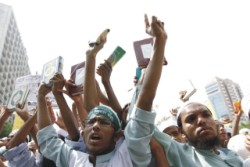Human Rights Watch
Bangladesh: Tightened control and broken promises
No justice for victims of rights abuses by security forces
 |
Photo: hrw.org |
The government of Bangladesh took no significant steps to investigate and prosecute torture in custody and extrajudicial killings during 2011 and showed an increasing intolerance for criticism, Human Rights Watch said in its World Report 2012.
Although the number of Rapid Action Battalion (RAB) killings has dropped following domestic and international criticism, there was a sharp increase in enforced disappearances, leading to concerns that security agencies have replaced one form of abuse with another. The government violated the right to a fair trial when it staged mass trials for thousands being held for the 2009 massacre of army officers by troops in the Bangladesh Rifles (BDR). Human rights organizations, journalists, trade unions, and civil society activists remained at risk, with some suffering attacks.
“The government of Sheikh Hasina has made repeated promises to end abuses and ensure justice and accountability, yet the security forces remain above the law,” said Brad Adams, Asia director at Human Rights Watch. “In the past year the government has moved from saying it would take action against abusive forces to denying abuses or defending the actions of the same abusive security forces that it complained about when it was in opposition.”
In Bangladesh, the parliament took long overdue action in November to provide for returning property seized from the minority Hindu community. The action amended a 1965 law, passed when Bangladesh was still part of Pakistan, which allowed the appropriation of property of Hindus, who were suspected of supporting enemy India. Human Rights Watch cautioned, however, that the government should ensure that the new law is not used to target its political enemies. Belatedly, the government also took the positive step in bilateral meetings of protesting the killing of hundreds of Bangladeshi nationals by India's Border Security Force over the past 10 years.
The Awami League government has taken steps to promote women's rights, making commendable progress in reducing infant and maternal mortality rates. It introduced a policy to advance women's rights in 2011, which among other things guarantees women an equal share and opportunity in employment and full control over their earnings. The government has also committed to developing a national strategy for social security, a positive step that could help reduce the high poverty levels among female-headed households.
However, the state continues its decades' long discrimination against women under personal status laws and fails to take adequate measures to protect women and girls from violence. Violence against women is rampant, with religious leaders or village elders imposing illegal punishments under the garb of “fatwas.” These include orders to whip girls, blacken their faces, or otherwise humiliate them publicly for “immoral behavior.” In some cases, village elders illegally accused girls who reported rape or sexual abuse of having an affair and ordered them punished. The Bangladesh high court division ordered the government to take action against such extrajudicial punishments, but the government did not carry out court orders. The parliament passed a law in 2010 against domestic violence but has yet to introduce any rules for its implementation.
Bangladeshi human rights groups have documented nearly 1,600 extrajudicial killings since 2004. Many were disguised by law enforcement institutions as “crossfire killings.” The main unit responsible is the RAB, although that same culture of violations and impunity is infecting other security forces as members rotate back to their parent units in the police or intelligence departments, Human Rights Watch said.
“Despite clear and voluminous evidence of Rapid Action Battalion responsibility, the government has not held anyone in RAB accountable for the large numbers of extrajudicial killings,” Adams said. “While the government talks proudly of its democratic credentials, it seems to forget that a key component of a democracy is ensuring the safety of its citizens from state sponsored violence.”
For details please visit: www.hrw.org
Source: Human Rights Watch.